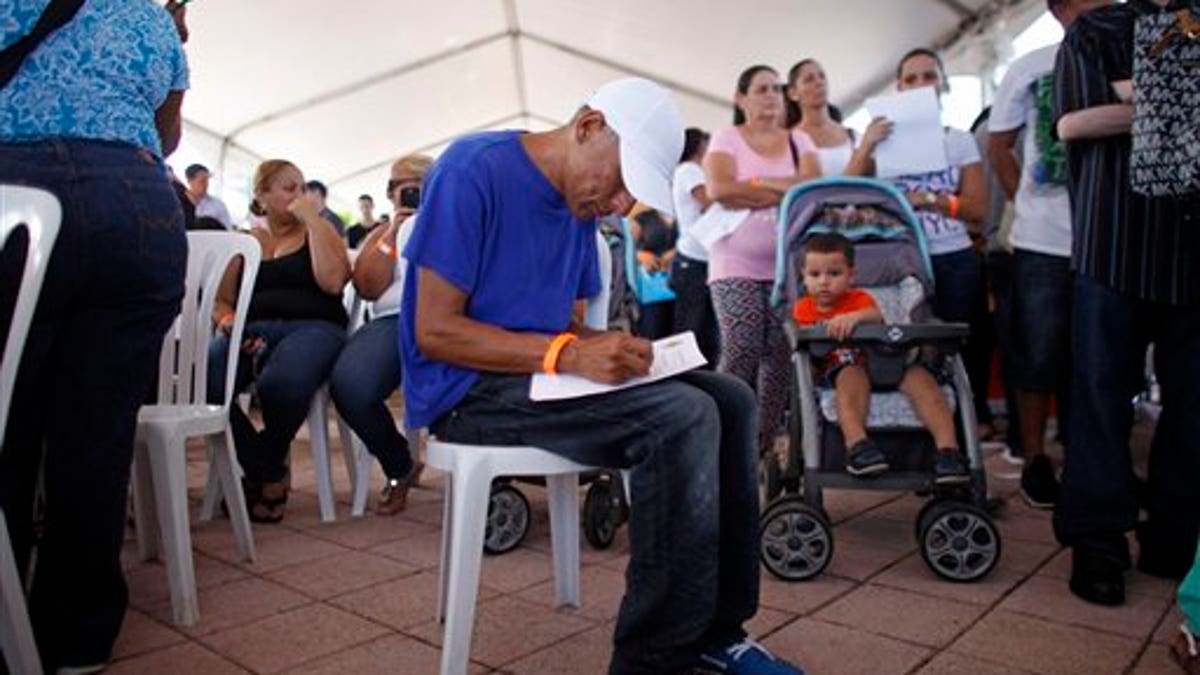
In this Sept. 25, 2013 photo, Jose Rodriguez fills out a contact form at a job fair in Catano, Puerto Rico. Puerto Rico's unemployment rate is 13.9 percent, the highest compared with any U.S. state. (AP Photo/Ricardo Arduengo)
San Juan, Puerto Rico – Sweat gathered on the back of Gilberto Olivo's shirt as he tried to divert attention from his resume at a recent job fair in the working-class town of Catano.
Once a chemical engineer who held managerial positions in the U.S. and Puerto Rico, Olivo became unemployed five years ago. Talking to a recruiter, the 64-year-old knew his former career might make him overqualified for jobs available now that could help him pay his mortgage, his daughter's college tuition and other costs.
"I'll do anything," Olivo said in all seriousness. "I'll clean floors, I'll wash dishes, I'll be an errand boy."
Olivo's predicament has become disturbingly common for many beleaguered lower- and middle-class residents of this U.S. territory, where energy, food and other costs were already much higher than those in the U.S. mainland. Now, the island's cost of living is hitting unsustainable levels for people such as Olivo as the government passes a flurry of new taxes and increases in water and sewer rates that are adding hundreds of dollars onto monthly budgets.
Gov. Alejandro Garcia Padilla has said the island needs the new revenue to close a budget deficit and improve the near-junk status of its general obligation bonds while it hobbles through its seventh straight year of recession. But critics say the new measures are hurting potential economic recovery by squeezing Puerto Ricans who were already barely making ends meet.
"We inherited a chaotic situation, and in 8 ½ months, we've done a lot," Garcia said after meeting with Wall Street credit agencies in late September in hopes of improving the status of the island's bonds. "We've done everything we had to do."
However, Gustavo Velez, a prominent local economist, said it wasn't clear yet whether the new measures would do more harm than good.
Next year, the economy is expected to contract by as much as 2 percent as Puerto Rico remains burdened by $69 billion in public debt and an unemployment rate of 13.9 percent, higher than any U.S. state.
"It's like a Catch-22," Velez said. "The big question is whether the economy is capable of absorbing the impact of these taxes. .... It's a question we cannot yet answer."
Some critics say the island's public spending is the problem.
The new business tax was enacted "to maintain a level of government spending that Puerto Rico's economy cannot sustain," said Priscilla Vazquez, spokeswoman for the Manufacturers Association of Puerto Rico, which is requesting a moratorium on the tax.
Tens of thousands of Puerto Ricans have already left the island for better opportunities elsewhere, including Olivo's two sons who sought new jobs in the U.S. Olivo said he is too old to start a new life with them, noting he's still paying a $750 monthly mortgage and tuition costs with the help from his wife, a social worker.
Meanwhile, Olivo's monthly water bill has more than doubled from $70 to $150, and gas prices have spiked following an increase in taxes on each barrel of crude oil from $3 to $9.25. He's adjusted by spending more time at home or walking instead of driving. If forced to use the car, Olivo buys only a few gallons (liters) at a time. He said three years have passed since he last bought any personal items for himself.
"Those increases have been a disaster," he said. "I can't afford to live in Catano now on Social Security alone. ... I used to make more than $80,000 a year. To go from $80,000 to $0, imagine that."
Such reactions prompted Treasury Secretary Melba Acosta to delay a portion of the oil tax increase in mid-August to give officials time to study its impact on prices, while the state water and sewage company has made concessions to help lower water bills for certain commercial and private consumers. As it stands, residential clients who use up to 35 cubic meters of water a month are paying almost double now. Some commercial clients have seen their bill go up by several thousands of dollars.
"This has definitely had an impact on everyone," said Eugenio Alonso, president and CEO of Consumer Credit Counseling, noting that electricity costs are already on average double those on the mainland. "Business owners are saying, 'I can't do this anymore given the costs.' They declare bankruptcy or simply close."
The new business tax is expected to generate nearly $500 million a year and applies to gross sales of companies generating $1 million or more a year. Another new tax applies to commercial bank transactions.
Wendy Cordova, a 37-year-old widow with five children who relies on Social Security and her income as a hair stylist, said she's struggling to make car payments and pay the medical bills of her 13-year-old daughter, a diabetic. She already sent another daughter to live with her brother in the U.S. to finish high school.
"Everything keeps going up, and people are still making the same salary," she said. "We're going from bad to worse."
Nonprofit organizations across the island, meanwhile, have noted an increase in people seeking help. The concern now is that electric bills will rise next, given that the state power company depends largely on petroleum.
It's another reason Olivo, the chemical engineer, wants a job. He said he had a stroke in May that he blames on financial stress.
As he met with one last recruiter at the job fair, he learned they might need someone to help oversee the reorganization of a nearby factory.
"Do you have immediate availability?" the recruiter asked.
"Yes," Olivo answered. "Right now."
Based on reporting by the Associated Press.
Follow us on twitter.com/foxnewslatino
Like us at facebook.com/foxnewslatino




















